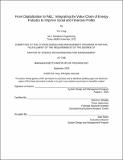| dc.contributor.author | Yang, Fei,
S.M.
Massachusetts Institute of Technology. | en_US |
| dc.contributor.other | Massachusetts Institute of Technology. Engineering and Management Program. | en_US |
| dc.contributor.other | System Design and Management Program. | en_US |
| dc.date.accessioned | 2021-10-08T17:10:23Z | |
| dc.date.available | 2021-10-08T17:10:23Z | |
| dc.date.copyright | 2020 | en_US |
| dc.date.issued | 2020 | en_US |
| dc.identifier.uri | https://hdl.handle.net/1721.1/132879 | |
| dc.description | Thesis: S.M. in Engineering and Management, Massachusetts Institute of Technology, System Design and Management Program, September, 2020 | en_US |
| dc.description | Cataloged from the official version of thesis. | en_US |
| dc.description | Includes bibliographical references (pages 87-89). | en_US |
| dc.description.abstract | The business landscape for a typical super major oil company has shifted tremendously in the past few years, displaying in numerous aspects including the much lower oil and gas prices, the significant learning curves on unconventional assets, and the competition with alternative energy sources. In this challenging environment, integration and optimization of the full value chain serve as an excellent opportunity for the enterprise to improve its financial and social benefits. Utilizing architecting innovative enterprise strategy (ARIES) framework, literature reviews, inputs from subject matter experts, and digital applications, this thesis explores the potential of systematically transforming a typical major oil company to integrate its value chain. The current status of the enterprise was reviewed through ten enterprise lenses, the desired future of the enterprise was envisioned, and the step-by-step transformation was designed. Numerous methodologies were applied to effectively architect the transformation. The utilization of digital tools to integrate and optimize the value chain was assessed. The applications of digitization and digitalization were clarified; the three building blocks of the digital core of the enterprise, including data engineering, data science, and business intelligence, were explored. The pathway of adding value via data utilization across the value chain was investigated in the research, followed by two case studies of using digital solutions to optimize long-term and short-term benefits. Due to the complex nature of the value chain, compounded with the challenges from the broader ecosystem, a systematic approach to architect the transformation, primarily the ARIES framework, is found to exhibit high potential to fulfill the needs of the stakeholders. With a clear business vision, a robust digital core, and an integrated decision-making process, digital applications can be potent tools to enable the optimization of the value chain for an oil enterprise. | en_US |
| dc.description.statementofresponsibility | by Fei Yang. | en_US |
| dc.format.extent | 93 pages | en_US |
| dc.language.iso | eng | en_US |
| dc.publisher | Massachusetts Institute of Technology | en_US |
| dc.rights | MIT theses may be protected by copyright. Please reuse MIT thesis content according to the MIT Libraries Permissions Policy, which is available through the URL provided. | en_US |
| dc.rights.uri | http://dspace.mit.edu/handle/1721.1/7582 | en_US |
| dc.subject | Engineering and Management Program. | en_US |
| dc.subject | System Design and Management Program. | en_US |
| dc.title | From digitalization to P&L : integrating the value chain of energy industry to improve social and financial profits | en_US |
| dc.type | Thesis | en_US |
| dc.description.degree | S.M. in Engineering and Management | en_US |
| dc.contributor.department | Massachusetts Institute of Technology. Engineering and Management Program | en_US |
| dc.identifier.oclc | 1263356477 | en_US |
| dc.description.collection | S.M.inEngineeringandManagement Massachusetts Institute of Technology, System Design and Management Program | en_US |
| dspace.imported | 2021-10-08T17:10:22Z | en_US |
| mit.thesis.degree | Master | en_US |
| mit.thesis.department | SysDes | en_US |
